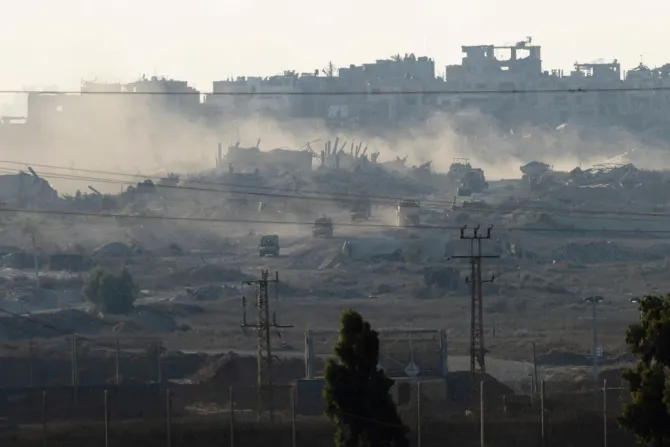Israeli Embassy Criticizes Holy Land Catholic Leaders for Statement on ‘Just War’
By Jonah McKeown
Israel’s embassy to the Holy See is criticizing a recent statement by Catholic leaders in the Holy Land that suggested Israel’s ongoing campaign in Gaza is not a “just war.”
In a statement on June 30, the Justice and Peace Commission of the Holy Land implied that Israel’s behavior in Gaza goes beyond the “proportionate use of force” necessary for a war to be rooted in justice.
The commission, sponsored by the Assembly of the Catholic Ordinaries of the Holy Land, brings together Latin and Eastern Catholic leaders in Israel, Palestine, Jordan, and Cyprus. It is led by Cardinal Pierbattista Pizzaballa, the Latin patriarch of Jerusalem.
The June 30 statement pointed to the high death toll in Gaza as a sign that Israel’s conduct there is not just.
“As Catholics in the Holy Land who share Pope Francis’ vision for a peaceful world, we are outraged that political actors in Israel and abroad are mobilizing the theory of ‘just war’ in order to perpetuate and legitimate the ongoing war in Gaza,” the statement reads.
“This theory is being used in a way in which it was never intended: to justify the death of tens of thousands of our friends and our neighbors.”
The statement argued that in the case of Israel’s war in Gaza, it is clear that negotiations have not been exhausted before the use of force, among other issues.
“There are those pretending that the war follows the rules of ‘proportionality’ by arguing that a war that continues until the bitter end might save the lives of Israelis in the future, therefore balancing the scales of the thousands of Palestinian lives being lost in the present,” they said.
“In doing so, they privilege the security of hypothetical people in the future over the lives of living and breathing human beings who are being killed every day,” the Catholic leaders continued.
“It is in a spirit of hope that we cannot allow words like ‘just’ to be mobilized to justify what is unjust, cruel, and devastating. We must argue for the integrity of language because we remain convinced that true justice is still possible if we can hold fast to its promise.”
Israel Seeks to Prevent Further ‘Atrocities,’ Embassy Says
In a response posted to social media on July 2, the Israeli embassy to the Holy See characterized the statement as “using religious pretext and linguistic stunts” to de facto object to Israel’s “right to defend itself.”
The embassy stated that Israel’s objective from the beginning of the conflict was “to end Hamas rule in the territory and secure that atrocities like the ones committed on Oct. 7 [2023] will not happen again.”
The embassy also took issue with the Catholic leaders’ framing of post-Oct. 7 events as “the war in Gaza” and said criticisms of the disproportionate nature of the fighting create “a false symmetry that reflects bias and one-sidedness.”
They noted that Hamas terrorists have embedded themselves in civilian areas, putting noncombatants at risk.
The Church teaches in the Catechism of the Catholic Church that in order for a war to be justified, in part, “the use of arms must not produce evils and disorders graver than the evil to be eliminated” (No. 2309).
Pope Francis himself has questioned the concept of just war saying “war is essentially a lack of dialogue.” Just this week, a top Vatican official said the concept of just war “is being reviewed.”
This is not the first time the Israeli embassy to the Holy See, led by outgoing ambassador Raphael Schutz, has criticized Catholic leaders’ statements on the war.
In December 2023, Schutz accused Pizzaballa of “blood libel” for saying that two Christian women in Gaza had been intentionally killed “in cold blood” by the Israel Defense Forces (IDF).
Pope Francis had joined the patriarchate in condemning the women’s deaths, going so far as to call it an act of “terrorism” during his Dec. 17 Angelus address.
And in May, the embassy sharply condemned a Yemeni Nobel laureate’s comments on Israel’s alleged “genocide” in Gaza, which she made at a Vatican conference.
Schutz, however, told the Italian news wire ANSA that the remarks “should have no influence on bilateral relations” as the “shameful statement was not made by the Vatican or on behalf of the Vatican.”
This article was first published by Catholic News Agency EWTN Norway’s news partner and has been adapted by EWTN Norway.
Photo credit:
An Israeli army convoy leaves the Gaza Strip as seen from a position on the Israeli side of the border on July 3, 2024 in southern Israel. | Credit: Amir Levy/Getty Images




